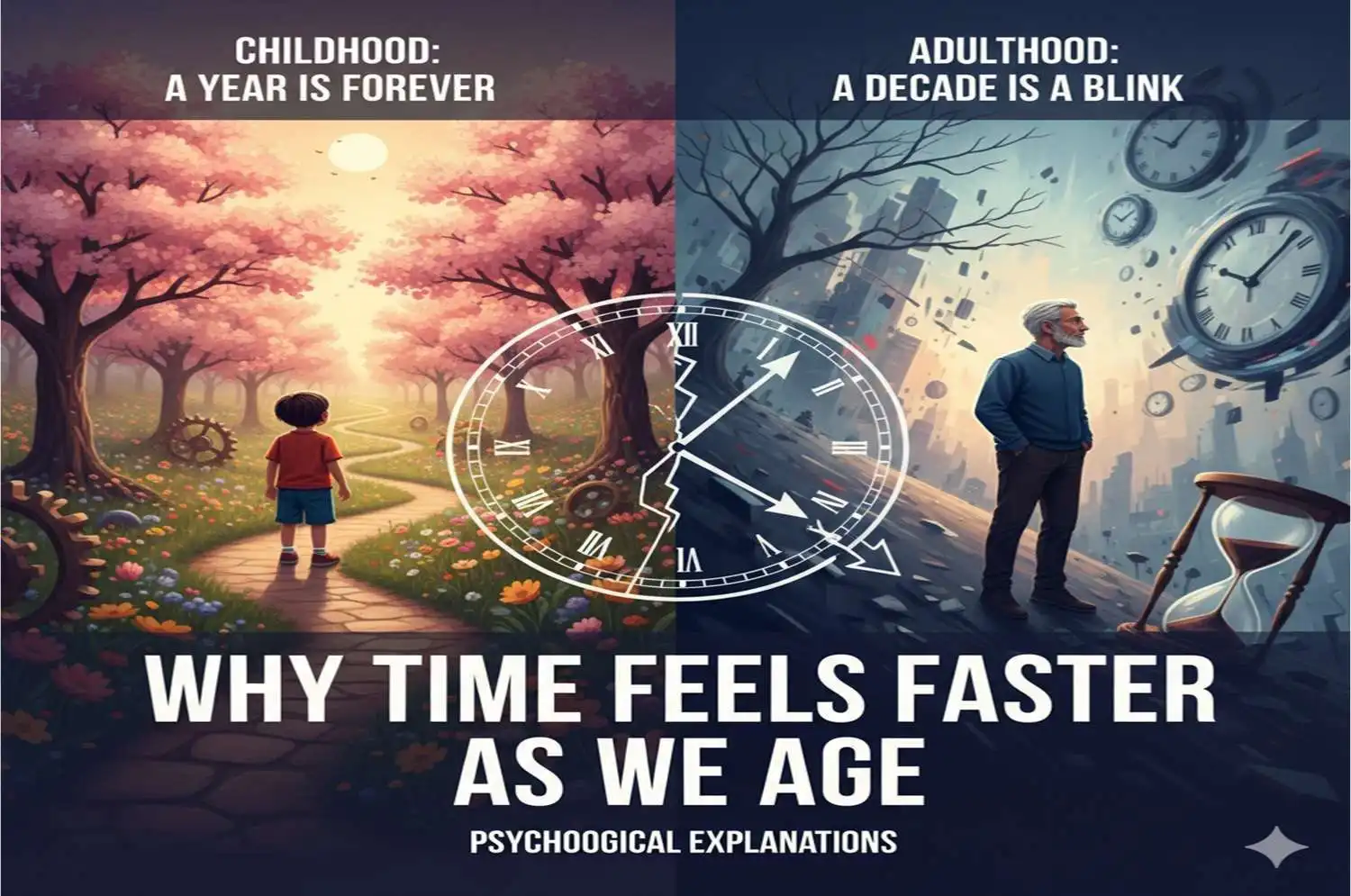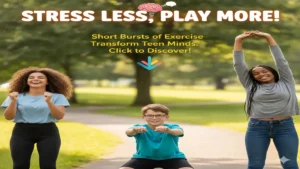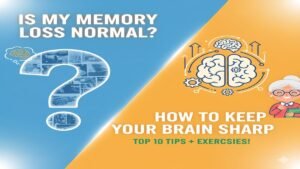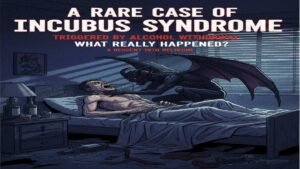“Remember how endless summer vacations felt as a child, but now years seem to fly by? You’re not alone.”
Introduce the core psychological puzzle: why time perception changes with age.
Briefly highlight what the reader will learn (scientific insights + practical takeaways).
The Psychology of Time Perception
How Our Brain Processes Time
Our sense of time isn’t measured by a clock but by the brain’s internal mechanisms. Neuroscientists suggest that the brain relies on networks involving the prefrontal cortex, cerebellum, and basal ganglia to track moments and events. Unlike vision or hearing, time perception has no single organ; instead, it’s constructed from attention, memory, and sensory inputs. This explains why minutes can feel endless during boredom but fly by during excitement. Understanding how the brain perceives time provides insight into why time feels faster as we age.
Childhood vs. Adulthood: Why Time Feels Different
As children, life feels long and summers seem endless. Psychologists explain this through the “proportional theory”—when you’re 10 years old, a single year equals 10% of your life, but at 50, it’s just 2%. This makes each passing year feel shorter in comparison. Additionally, childhood is filled with novel experiences, creating more vivid memories that stretch our perception of time. By adulthood, routines dominate, making days blend together and reinforcing the feeling that time speeds up as we get older.
Memory and Novelty: The Role of New Experiences
Memory plays a crucial role in shaping time perception. The brain encodes new and emotionally engaging events in greater detail, which makes them feel longer in retrospect. That’s why vacations, new jobs, or major life changes seem to expand time. In contrast, repetitive daily routines create fewer unique memories, so weeks or months can feel like they vanish. This connection between novelty, memory, and perception highlights a psychological truth: embracing new experiences is one way to slow down the feeling that time feels faster as we age.
Psychological Theories Explaining Faster Time Perception
Proportional Theory – Years Shrink in Comparison
One of the most widely discussed explanations for why time feels faster as we age is the proportional theory. In childhood, a single year is a huge fraction of our life—one-fifth at age five, but only one-fiftieth at age fifty. As a result, each passing year feels subjectively smaller compared to our total lived experience. This shrinking proportion may explain why birthdays, holidays, and even entire decades seem to fly by as we get older.
Routine vs. Novelty – The Power of Firsts
Novel experiences tend to stretch our perception of time, while routine compresses it. Remember how long a childhood summer felt? That’s because it was filled with “firsts”—first bike rides, first friendships, first adventures. In adulthood, days often blur together with repetitive routines, making weeks and months slip by unnoticed. Psychologists argue that introducing novelty—learning a new skill, traveling, or breaking routines—can slow down how quickly time seems to pass.
Attention and Focus – Why Busy Lives Blur Time
Our brains process time partly through attention. When we are deeply focused or distracted by multiple responsibilities, we pay less conscious attention to the passage of time. Modern adult life—juggling careers, family, and endless digital notifications—creates a constant state of busyness. This lack of mindful attention makes days vanish into weeks, fueling the feeling that time speeds up with age.
Emotional Engagement – How Feelings Shape Time Flow
Emotions also play a crucial role in shaping time perception. Highly emotional or meaningful moments feel longer and more vivid, while emotionally flat periods compress in memory. Childhood is filled with strong feelings of wonder, excitement, and even fear, which slow time down. By contrast, adult life often grows more emotionally predictable, reducing the intensity of experience and making time appear to accelerate.
Real-Life Examples We Can Relate To
When exploring why time feels faster as we age, it helps to look at everyday experiences we all share.
Childhood Vacations vs. Adult Work Weeks
Remember those long summer breaks in childhood? Each day felt endless, filled with new adventures, games, and discoveries. Contrast that with adulthood—where a five-day workweek can pass in a blur of meetings, deadlines, and routines. Novelty makes time feel longer, and since childhood is filled with newness, those moments feel stretched. In adulthood, routine compresses our perception, making weeks fly by almost unnoticed.
How Festive Seasons Feel Shorter as We Age
As children, festivals like Diwali or Christmas seemed to take forever to arrive, and once they did, the celebrations felt magical and never-ending. As adults, however, festive seasons rush past. Preparations, responsibilities, and the quick return to routine make these moments feel fleeting. The excitement is still there, but our brains process the familiar traditions faster, shrinking our sense of duration.
Can We Slow Down Time Perception?
Psychologists often emphasize that while we cannot literally slow the passage of time, we can influence how we experience it. Many people ask why time feels faster as we age, and the answer lies not only in brain processing but also in the way we structure daily life. By shifting our habits, we can make moments feel richer, longer, and more memorable.
Practicing Mindfulness and Present Awareness
Mindfulness is one of the most effective tools for reshaping time perception. When we fully engage with the present moment—whether through meditation, mindful breathing, or simply paying attention to our surroundings—we create a heightened sense of awareness. This intentional presence makes experiences feel deeper and less rushed, helping counter the sensation that the days are slipping by too quickly.
Embracing New Learning and Novelty
Our brains encode new experiences with greater detail, which makes them feel longer in hindsight. That’s why childhood, filled with constant “firsts,” feels slower compared to adulthood routines. Actively seeking novelty—learning a new skill, traveling to unfamiliar places, or even changing your daily route—can stretch time perception and prevent life from feeling like a blur.
Creating Meaningful Memories
Time often feels faster when our days are filled with repetition. By focusing on experiences that carry emotional significance—spending quality time with loved ones, celebrating milestones, or engaging in meaningful hobbies—we create strong memory anchors. These vivid moments expand our sense of time and enrich our overall life narrative.
Slowing Daily Routines with Reflection
Rushing through daily tasks adds to the illusion of time speeding up. Taking a few minutes each day to reflect—through journaling, gratitude practices, or quiet walks—slows down mental processing and gives the brain space to encode events more clearly. This small shift not only eases stress but also makes life feel less hurried.
Why Understanding This Matters for Mental Wellbeing
The phenomenon of why time feels faster as we age isn’t just a curiosity—it has direct implications for mental wellbeing. When people feel like years are slipping by, they may experience dissatisfaction, regret, or anxiety about not achieving enough. Understanding this perception helps reframe the way we approach life.
Impact on Happiness and Fulfillment
Research shows that when individuals become aware of how their minds process time, they often value the present moment more. By recognizing that time feels faster with age, we can actively prioritize meaningful experiences, relationships, and personal growth instead of letting life slip into routine autopilot. This shift supports both happiness and a deeper sense of fulfillment.
Encourages Intentional Living
Awareness of this psychological pattern encourages people to slow down and live intentionally. Whether it’s practicing mindfulness, creating new memories, or setting goals that align with personal values, understanding time perception pushes us to engage with life more consciously. Instead of fearing lost time, we can transform that awareness into motivation to live with purpose.
Read Also:
Psychology says people judge you instantly for these 9 details in your outfit










1 thought on “Why Time Feels Faster as We Age: Psychological Explanations”